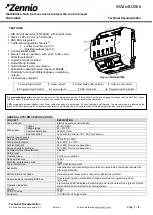
3
Referance Manual
ETH-LORA-M-AX-01
092419
NETWORK ARCHITECTURE
LORA NETWORK DIAGRAM EXAMPLE
Figure 3
LoRa End Nodes:
End device which contains the sensors necessary to execute their role (examples: temperature, humidity, water level, presence,
etc). These devices embed also a LoRa RF transceiver (also known as radio) which will be used to send the information to the gateways using LoRa
protocol.
LoRa Gateways:
All gateways receive data on all channels all the time. Gateways act as transparent bridges forward the data to the network server
or to the end devices without performing any data validation in both ways. Gateways forward message using LoRa RF to the end devices and using
IP to LoRa servers.
LoRa Server:
The typical roles of the server are monitoring and managing the gateways and the security, removing the redundancy data and performing
the billing. The server also distributes the data to the application server (i.e. interface directly with AWS or directly with applications via web socket.
NwkSKey
(Network Session Key) is shared between the end device and the network server. It’s used in the message integrity verification for the
communication and it also provides security for the end device towards the network server communication.
AppSkey
(Application session Key) is shared between the end device and the application server. It guarantees the security of the application’s payload
as it is used to encrypt and decrypt the application data. This means that the network server cannot decipher the application data.
LORAWAN CLASS
LoRaWAN defines the communication protocol and system architecture for the network while the LoRa physical layer enables the long-range
communication link. LoRaWAN has several different classes of end-point devices to address the different needs reflected in the wide range of
applications.
Figure 4






































